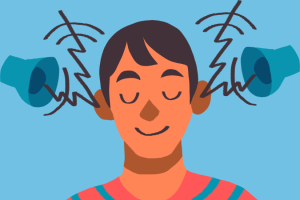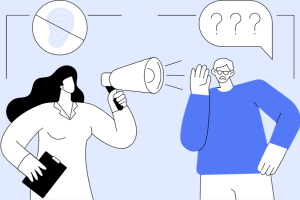Have you ever found yourself straining to catch a whispered conversation or constantly requesting that others repeat themselves? Does the world sometimes seem muted, making it challenging to engage in everyday conversations or enjoy the symphony of life’s sounds? If you’ve pondered these questions, you’re not alone. Hearing loss can affect individuals of all ages and backgrounds, and its gradual onset often goes unnoticed until it significantly impacts our daily lives.
Hearing is not just about volume; it’s about the richness and clarity of the sounds around us. Normal hearing allows us to enjoy the melodious chirping of birds, engage in effortless conversations, and revel in the myriad of everyday sounds that make up our world.
Hearing loss is a multifaceted condition that can manifest in various ways. Conductive hearing loss may leave you struggling to discern muffled voices, while sensorineural hearing loss might lead to challenges in perceiving high-pitched tones or low-frequency sounds. Tinnitus, a persistent ringing or buzzing in the ears, can also be a companion to hearing loss, further complicating one’s auditory experience.
As we explore how good is our hearing in this self-assessment quiz, we will uncover these nuances and provide a glimpse into the diverse ways in which hearing loss can manifest. Remember, this quiz is a starting point—an opportunity to raise awareness about your hearing and consider seeking professional guidance if any concerns arise.

1. Do you often ask people to repeat themselves during conversations?
-
- Never
- Occasionally
- Frequently
- Always
2. Do you have difficulty understanding speech in noisy environments (e.g., restaurants, parties)?
-
- Never
- Occasionally
- Frequently
- Always
3. Do you find it challenging to hear the television or radio at a volume that is comfortable for others?
-
- Never
- Occasionally
- Frequently
- Always
4. Do you have trouble hearing the doorbell or phone ring?
-
- Never
- Occasionally
- Frequently
- Always
5. Do you often need to turn your ear towards someone to hear them better?
-
- Never
- Occasionally
- Frequently
- Always
6. Have family members or friends expressed concern about your hearing?
-
- Never
- Occasionally
- Frequently
- Always
7. Do you experience ringing or buzzing in your ears (tinnitus)?
-
- Never
- Occasionally
- Frequently
- Always
8. Have you ever had a job or hobby that exposed you to loud noises (e.g., construction, concerts, shooting)?
-
- Yes
- No
9. Do you have a history of ear infections or ear-related health issues?
-
- Yes
- No
10. Do you find it challenging to hear soft or whispered speech, even in a quiet environment?
-
- Never
- Occasionally
- Frequently
- Always
11. Have you noticed a decrease in your ability to hear high-pitched sounds, like birds singing or a tea kettle whistling?
-
- Never
- Occasionally
- Frequently
- Always
12. Do you often misinterpret what others are saying, leading to misunderstandings in conversations?
-
- Never
- Occasionally
- Frequently
- Always
13. Have you noticed a decrease in your ability to hear low-frequency sounds, such as deep voices or the bass in music?
-
- Never
- Occasionally
- Frequently
- Always
14. Do you avoid social situations or gatherings because it’s challenging to follow conversations or hear what’s going on?
-
- Never
- Occasionally
- Frequently
- Always
15. Have you experienced dizziness, balance issues, or ear pain along with changes in your hearing?
-
- Never
- Occasionally
- Frequently
- Always
- Count the number of times you selected “Frequently” or “Always.”
- If you answered “Frequently” or “Always” to multiple questions, it may indicate a potential hearing issue.
- Regardless of your quiz results, if you have concerns about your hearing, it’s essential to consult with a healthcare professional or audiologist for a comprehensive evaluation.

Normal hearing:
- Bird chirping outside: You should be able to hear this sound clearly, with good definition between the individual chirps.
- Person talking in a normal voice: You should be able to understand what the person is saying without having to ask them to repeat themselves.
- Door closing: You should be able to hear the door closing with a clear, solid thud.
- Car driving by: You should be able to hear the car driving by as a smooth, continuous sound, with the pitch changing slightly as the car gets closer and further away.
- Baby laughing: You should be able to hear the baby laughing clearly and distinctly, with good definition between the individual giggles.
Conductive hearing loss:
- Person talking in a muffled voice: If you have conductive hearing loss, you may have difficulty understanding what the person is saying, as their voice may sound muffled or distant.
- Water running in a sink: If you have conductive hearing loss, you may have difficulty hearing the water running in the sink, as the sound may be muffled or distorted.
- Doorbell ringing: If you have conductive hearing loss, you may have difficulty hearing the doorbell ringing, as the sound may be muffled or faint.
- Whisper: If you have conductive hearing loss, you may have difficulty hearing a whisper, as the sound may be too soft or muffled.
Sensorineural hearing loss:
- High-pitched tone: If you have sensorineural hearing loss, you may experience difficulty hearing high-pitched tones, such as the sound of a dog whistle or a baby crying.
- Low-pitched tone: If you have sensorineural hearing loss, you may experience difficulty hearing low-pitched tones, such as the sound of a man’s voice or a rumble of thunder.
- Ringing sound in the ear (tinnitus): If you have sensorineural hearing loss, you may experience tinnitus, which is a ringing, buzzing, or hissing sound in the ear.
- Buzzing sound in the ear: If you have sensorineural hearing loss, you may experience tinnitus, which is a ringing, buzzing, or hissing sound in the ear.
- Distorted sound: If you have sensorineural hearing loss, you may experience distorted sound, which can make it difficult to understand speech or other sounds.
Regardless of your quiz results, if you have concerns about your hearing, it’s essential to consult with a healthcare professional or audiologist for a comprehensive evaluation.
Book an appointment now:










